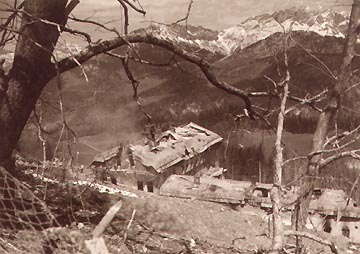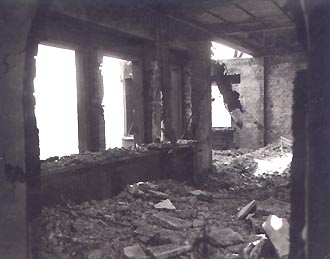SIGHTINGS
Retreat Gets New
Information Center
-
- A worker prepares an image for a permanent photo and documentary exhibition of pictures from the Second World War by the Institute for Contemporary History at Adolf Hitler's former holiday resort in Obersalzberg near Berchtesgaden, October 20. Photo by Michael Dalder REUTERS BERCHTESGADEN, Germany (AP) -- Berchtesgaden offers all the Alpine charm a tourist could hope for: Majestic snowcapped peaks. Sparkling lakes and streams. Bells tolling from church spires and clanking from the necks of cows.
Hitler's "Eagle's Nest" Retreat, restored - But a new exhibition unveiled Wednesday details the area's sinister past: One of its most influential visitors was Adolf Hitler.
- He took over a Berchtesgaden suburb, the hilltop village of Obersalzberg, and exploited the area's simple way of life and picturesque beauty for Nazi propaganda.
- Photos of Hitler in the Alps above Berchtesgaden showed a gentle, nature-loving Fuehrer -- images that helped him seduce the nation.
- They also sealed a terrible legacy for Berchtesgaden that the town and state of Bavaria are only now addressing with the permanent exhibit. Its photos, films, newspaper clippings and interactive computer databases aim to educate tourists and residents by showing the connection between propaganda from Obersalzberg and the Third Reich's crimes during World War II.

Eagle's Nest after intense allied bombing - The leader of Berlin's Jewish community, Andreas Nachama, praised the new exhibit, saying when he visited the area six years ago he was "strongly angered that there was no information -- only souvenirs."
- After World War II and until 1995, U.S. military forces occupied Obersalzberg as a ski-and-golf resort. This, organizers and state officials maintain, is the only reason an exhibit was not put up sooner.
- Until now, a complete picture of the local history has been hard to come by.
- A visitor walks along a spooky tunnel in the almost 2 mile long bunker system in the Obersalzberg mountain in Berchtesgaden, Germany, Tuesday, Oct. 19, 1999. (AP Photo/Diether Endlicher) Tourists can take buses up steep, hairpin turns to Hitler's mountaintop house, dubbed the "Eagle's Nest," one of the few Third Reich buildings that survived the war.

Remains of the chalet windows where Hitler would often stand
to overlook the Alps of Austria from Eagle's Nest- Once up there, after admiring the view and eating a snack, visitors can buy books and videotapes about how Hitler and the Nazis drove out Obersalzberg's local residents and turned the village into a seat of Third Reich government.
- Martin Bormann, Hitler's secretary, had a house there, as did Luftwaffe chief Hermann Goering. A luxury hotel for Third Reich bigwigs, once used by the American military, still stands. And underneath the whole complex stretches an intricate bunker network where Hitler and his aides planned to hide from the Allies.
- It's the spin on this information that has raised concerns and fueled the drive for the new documentation center. While some tourist information in Obersalzberg mentioned the Holocaust, most didn't. Some material even veered toward the neo-Nazi, such as videotapes titled "Hitler: The Unknown Artist," and "He Was Our Boss."
- The new center juxtaposes pictures of the war's horrors -- children being led to their deaths -- with idyllic snapshots of Hitler surrounded by laughing children.
- Director Horst Moeller said putting the Nazi propaganda on exhibit will help people understand how Hitler was able to come to power.
- And tourists who venture to the Eagle's Nest now have a place to go to for information on Hitler's activities in Obersalzberg.
- Only history buffs have known exactly what to look for and they include the occasional Nazi devotee, such as the elderly man who comes every year from England to lay a wreath on Hitler's birthday -- or 68-year-old Reinhold Renz, from Stuttgart, who says he hikes to the Eagle's Nest every spring to pay homage.
- "Hitler was the best leader we ever had," said Renz, who spoke in May with a visiting journalist on the mountaintop. "Hitler was for Germany. He was so modest and unassuming."
- A worker prepares an image for a permanent photo and documentary exhibition of pictures from the Second World War by the Institute for Contemporary History at Adolf Hitler's former holiday resort in Obersalzberg near Berchtesgaden, October 20. Photo by Michael Dalder REUTERS BERCHTESGADEN, Germany (AP) -- Berchtesgaden offers all the Alpine charm a tourist could hope for: Majestic snowcapped peaks. Sparkling lakes and streams. Bells tolling from church spires and clanking from the necks of cows.
-
SIGHTINGS HOMEPAGE